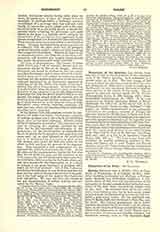

Dispersion of the Apostles (Lat. Divisio Apostolorum), a feast in commemoration of the missionary work of the Twelve Apostles. It is celebrated as a double major on July 15. The first vestige of this feast is found in the sequence composed for it by a certain Godescalc (d. 1098) while a monk of Limburg on the Haardt; he also introduced this feast at Aachen, when provost of the church of Our Lady. The sequence is authentic beyond doubt (G. M. Dreves, Hymnographi Latini, L. 399, Leipzig, 1907; Idem, Godescalcus Lintburgensis, ib., 1897). It is next mentioned by William Durandus, Bishop of Mende (Rationale Div. Off. 7.15), in the second half of the thirteenth century. Under the title, “Dimissio”, “Dispersio”, or “Divisio Apostolorum” it was universally celebrated in the northern countries of Europe, but unknown during the Middle Ages in Spain and Italy. The object of the feast (so Godescalcus) is to commemorate the departure (dispersion) of the Apostles from Jerusalem for the various parts of the world, some fourteen years after the Ascension of Christ. According to Durandus some of his contemporaries honored this feast the (apocryphal) division of the relics (bodies) of St. Peter and St. Paul by St. Sylvester (Schulting, Bibl. eccl., 1591, 2. 2, 173 sq; M. Armellini, Chiese di Roma, 1891, 902 sq.). The feast is now kept with solemnity by modern missionary societies, in Germany and Poland, also in some English and French dioceses, and in the United States by the ecclesiastical provinces of St. Louis, Chicago, Milwaukee, Dubuque, and Santa Fe.
F. G. HOLWECK

